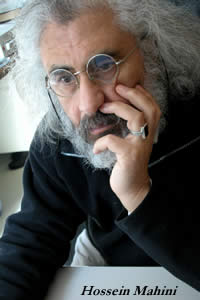 <b>Hossein Mahini</b> , a graduate of filmmaking from Iran,
<b>Hossein Mahini</b> , a graduate of filmmaking from Iran,worked as a film director in Iranian National Television until 1986
when he went to live in exile in Sweden. Since then, Mahini has worked
as an independent photographer and filmmaker and also as a staff member
in West Sweden’s Film Center (Film Centrum Vast).
Mahini is the Exile Film Festival’s founder and organizer.
Cinema Without Borders: Please tell us about the history of the Exile Film Festival and how you got involved with it.
Hossien Mahini: The
whole thing goes back to 1993, I actually started this and it was my
own idea. I had to leave my country, Iran, and live in Sweden and I
wanted, as a filmmaker, to use this medium in any possible way to show
why I was forced to leave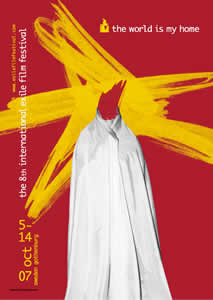 Iran and come here. Most of us, Iranian
Iran and come here. Most of us, Iranian
filmmakers in exile I mean, are scattered around the world and films
made by us, because of the distribution policies in the west, have
little chance of being seen by others. Therefore, I thought something
should be done. I believe that, besides our individual responsibilities
as filmmakers, filmmakers in exile also have a collective
responsibility. I thought we should get together in a social event and,
what would be better than a film festival for the films made in exile?
This way, we could also get to know each other and learn who is doing
what and plan collective movements and projects in different fields of
filmmaking. I mean to find common grounds in opposing the hostilities
that is going on in our countries of origin and also helping each other
in making films and marketing them.
At the beginning, the
event was called “An Overview of Iranian Cinema in Exile” and it was
just limited to screenings of the films made by Iranian filmmakers in
exile. All 64 of the films screened during the first festival were made
by Iranian Filmmakers living in different countries. The festival ran
from the 7th to the 14th of October, 1993 and more than one hundred
media outlets wrote about it. Even Film Centrum Vast made a 25 minute
documentary about the process of organizing the festival.
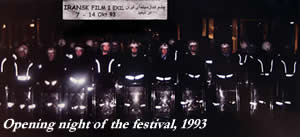 CWB: How did you come up with the international approach of the festival?
CWB: How did you come up with the international approach of the festival?
H. Mahini:
It was in the second festival that I realized that we can hold an
International Exile Film Festival. We knew that all the filmmakers
living in exile have a lot in common. We may come from different
backgrounds and come from different countries, but now we share a lot.
One who has escaped from a Latin American dictatorship or any other
totalitarian regime may have the same destiny as I, who had to leave a
theocracy. We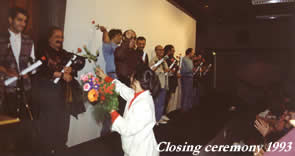 are all hurt and we are all fighting for democracy and it
are all hurt and we are all fighting for democracy and it
will only help us to get together and help each other. It was then that
I even found a slogan for this gathering; Nima, the great Iranian poet,
used a profound phrase in one of his letters, “The world is my home.”
And that was what we used to show where the heart of this festival is.
Therefore, from the second year of the festival in 1995, it was called
“The World is my Home” and films made by filmmakers in exile with
different nationalities and backgrounds were screened at the festival.
CWB: How are films selected for the festival?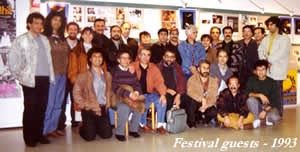 H. Mahini: The
H. Mahini: The
festival has a manifesto; we are showing the films of the filmmakers
living in exile regardless of the subject of the films. Some filmmakers
deal with political issues, others concentrate on individual human
issues, and there are even ones that just make experimental films. What
makes a filmmaker eligible to send a film to festival is that the
filmmaker has been forced to leave his/her country as he/she had been
opposing the values and rules enforced by the ruling government. The
only condition for a film to enter the festival is that it should have
the minimum technical requirement of a professional work. The festival
also has a few other events and each one has a theme; related films
and each one has a theme; related films
will be screened, even if their filmmakers are not exiles. For example
we have a section in the festival called, “The Odyssey of Cinema, The
Odyssey of Liberty”. In this section we show films that deal with
issues of democracy or social equality and justice.
This year we
have a new category called “Women Behind the Walls”. In this category,
we show movies that deal with women’s issues in the Middle East and
Africa and most of these movies deal with the influence of the religion
in those societies and the changes that they bring to the women’s
lives.
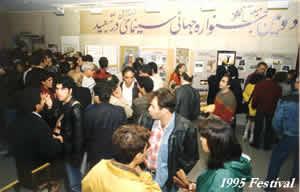 We have also another category this year called, “Women,
We have also another category this year called, “Women,
the Forgotten Victims of Wars”. Again, most of the movies in this
category are about women in places such as the Middle Eastern
countries, where nobody talks about female victims of the wars. In most
cases, the reason for such silence is traditional believes and what
people consider keeping the family honor. For example, we have a film
about Kurdish women in Turkey. The Turkish army attacks Kurdish
villages in order to arrest the men and, when this happens, men escape
to the mountains and Turkish army takes the Kurdish women to the
brigades as hostages in order to find out where their husbands are.
There are a lot of stories about these women being raped and then if
this happens they never dare to go back to their families as they have
destroyed the family’s honor. Therefore, most of those women end up in
the big cities as prostitutes. There are cases that women stay with
family but they never speak up about what has happened to them. In the
“Women, the Forgotten Victims of Wars” category, we have a collection
of films that deal with this issue and we hope we can open this case to
the public.
Also we have a section in the festival called that is a collection of films about prison and
massacres in prisons; the films are created by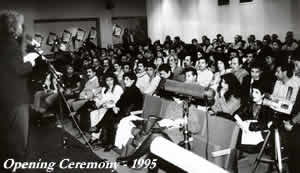 filmmakers that have
filmmakers that have
been prisoners themselves. They are now living in Canada, England, and
Germany and after leaving Iran have decided to become filmmakers and
tell their stories. One of the interesting issues is to find out why an
ex-political prisoner chooses the cinema for portraying his/her prison
experience. Also, it is important to find out how the prison experience
effects the story telling and the style of filmmaking utilized by these
filmmakers.
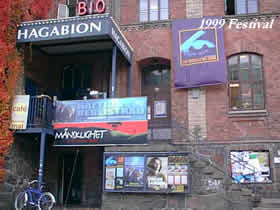 CWB: How do you define an exiled filmmaker in comparison to an emigrant filmmaker? Don’t they share similar characteristics?
CWB: How do you define an exiled filmmaker in comparison to an emigrant filmmaker? Don’t they share similar characteristics?
H. Mahini: We
are actually having a debate over who is an exiled filmmaker and how
he/she differs from emigrant filmmakers and what they have in common.
It has been my dilemma to explain to my Iranian friends that we are not
emigrated filmmakers, we are filmmakers in exile. An exiled person has
a conflict with the authorities of his/her homeland and refuses to
accept their rules, while an emigrant leaves his/her homeland in search
of a better life and could keep a dialogue open with his/her homeland
authorities. Because of such differences, there are always good chances
that films made by these two groups of filmmaker differ.
CWB: What countries have participated in the 2007 Exile Film Festival?
H. Mahini: We
have not yet passed the submission deadline but, until this date, we
have films from Iranian, Latin American, Eastern European, Kurdish, and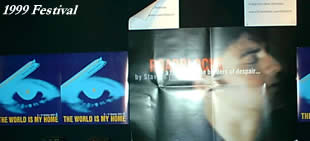
Palestinian filmmakers who are living in different countries.
CWB: Will any of the filmmakers attend the festival?
H. Mahini:
From what has become final, we will have an Afghani filmmaker as a
guest. For sure we will have a filmmaker coming who should be an expert
in Iraqi events for a section of the festival program called “Points of
Crises” and we will have other exiled filmmakers from Iran, Iraq and
Palestine. I should also add that we have African filmmakers that will
come to the festival and we are also inviting filmmakers living from
Sweden to attend our seminars and discussion panels.
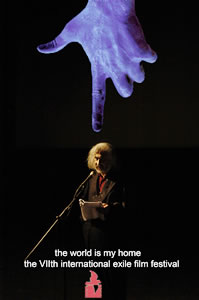 CWB: Is festival news reflected in local and international media?
CWB: Is festival news reflected in local and international media?
H. Mahini: A
festival like ours has the same destiny of an exiled filmmaker. Making
films for exiled filmmakers depends on many conditions to come together
and even when a film is made by an exiled filmmaker, in most cases it
is sidelined and forgotten. Of course, the situation in the U.S. is a
bit different as the whole society is an immigrant society. The United
States is a melting pot of different cultures but in Europe, an exiled
filmmaker is always a stranger. An exiled filmmaker is not a part of
main stream filmmaking, neither in production or distribution.
Therefore, the Exiled Film Festival has the same destiny as an exiled
filmmaker. Depending on the political climate of the world and the host
country, it can become the center of attention, be ignored, or even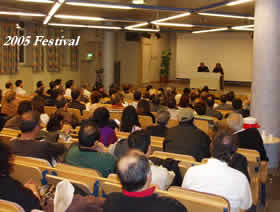
boycotted. Organizing a festival like this is more or less like
swimming against the stream. We have a lot of issues with both European
governments and European intellectuals. After the fall of the Soviet
Union and the Berlin Wall, many of the European intellectuals have
confused frame of mind. But still, there are many of these
intellectuals that, based off the roots of colonialism in their
subconscious mind, think they are the ones who should determine who is
a human in exile. But I believe it should be us—the people living in
exile—that should come up with this definition.
We have also problem
getting help and support for the festival when, for example, a company
like Volvo is trying to sell more cars to the countries that most of
the filmmakers in exile come from; of course, they don’t want to
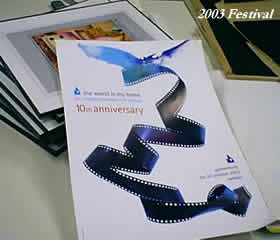 support any kind of event like ours.
support any kind of event like ours.
CWB: How do you see the future of the Exile Film festival?
H. Mahini:
The future of this particular festival depends on the future of the
world. Our festival was the first of its kind. Prior to our festival,
there was no festival for showing the films made by filmmakers in
exile. In film archives, films made by exiled filmmakers were listed
under films made by emigrants, but know we have changed this. The issue
of the exiled filmmakers is not limited to our small festival. With
increasing numbers of people that are forced to leave their homelands,
it is becoming a more and more important topic. Until these troubles
are over, the festival will go on. This is reflected in the present
situation of our festival also. Even though our festival is happening
in the same year as a major, government sponsored film festival; it has
been recognized as one of the three major events of the city. This is a
paradoxical situation and I don’t really want to live in exile, but
until conditions change, the festival will be there.
CWB: Thank you for your time.

